| Image | Title | Description |
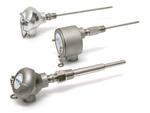
|
RTD Assemblies & Thermocouple Assemblies | Standard, easy-to-order assemblies fit a variety of applications. RTDs, Thermocouples, and Transmitters. Hazardous area approvals include CSA, FM, ATEX and IECEx. |
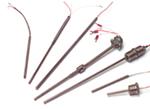
|
RTD Probes & Thermocouple Probes For Temperature Sensors | Tip-sensitive with copper tip (260°C), All stainless (260°C & 500°C), Mineral insulated (600°C). Single and dual elements. |
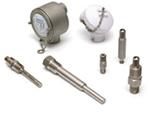
|
Thermocouple Accessories - RTD & Thermocouple Sensor Accessories | Stainless Steel and brass compression fittings, Spring-loaded holders, Thermowells and Connection Heads |
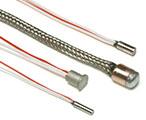
|
RTD Minature Sensors For Bearings & Thermocouple Mini Bearing Embedment Sensors | Small, rugged RTDs and thermocouples. Install in bearings for early warning of overheating. Bearing embedment or surface mount Bolt-on designs. Single or dual elements. |

|
Stator Winding RTDs and Thermocouples | Minco stator RTDs meet the specification of ANSI C50.10-1990, general requirements for synchronous motors. Six sensors are recommended for each motor, two per phase. |
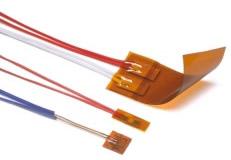
|
Thermal-Ribbon™ Flexible RTDs and Thermocouples | Thin, flexible surface mount RTDs and thermocouples. Kapton, silicone rubber, Mylar insulation. Response as fast as 0.1 seconds! |
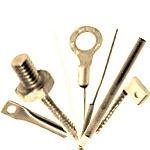
|
Bolt-On Temperature Sensors | Bolt-on temperature sensors are designed for easy installation in industrial and commercial environments. The sensors can be mounted on machines, against process pipes, or embedded directly into a machined part. |

|
HVAC Temperature Sensors and HVAC/R Sensors For HVAC Systems Temperature Measurement | RTDs, thermistors, and transmitters. Room air, outside air, duct, and fluid sensors. Platinum and Nickel-iron RTD's, 2252 or 10K ohm thermistors. |
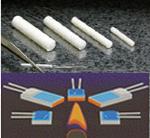
|
RTD Elements - Thin Film and Wire Wound RTD Elements By MINCO | Low cost thin-film elements, Wire wound elements. Accurate sensing from -200 to 850°C (-328 to 1582°F) |
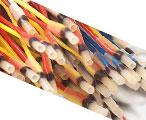
|
PTC Thermistors for Electric Motors | Reliable PTC thermistors that meet the specifications of DIN 44081 / 44082 provide overheating protection for motors and dynamic monitoring of critical system parameters. |
What Is A Temperature Sensor?
Temperature sensors are electronic components designed to detect and measure temperature in a specific environment. These sensors convert the measured temperature into an electrical signal that can be read and interpreted by a microcontroller or other electronic device. Temperature sensors come in various shapes, sizes, and technologies, each with its unique characteristics, accuracy, and operating range. From simple thermistors to highly accurate thermocouples and digital temperature sensors, there's a wide range of options available to suit diverse application requirements.
In general, temperature sensors are categorized into two main types: contact and non-contact.
Contact temperature sensors, such as thermocouples, thermistors, and resistance temperature detectors (RTDs), physically touch the object or medium being measured. Non-contact temperature sensors, like infrared thermopiles and pyrometers, measure temperature without making physical contact. The choice of temperature sensor depends on factors such as accuracy requirements, operating temperature range, environmental conditions, and available space. When selecting a temperature sensor, engineers must consider these factors to ensure optimal performance and accuracy in the measurements for their specific application.
Temperature Sensor Types
Thermocouples For Temperature Sensors
Thermocouples are among the most widely used temperature sensors, known for their wide measurement operating range and durability. A thermocouple consists of two dissimilar metals joined together at one end to form a junction. When there is a temperature difference between the junction and the other end of the thermocouple, a small voltage is generated. This voltage is directly proportional to the temperature difference, which allows the thermocouple to measure temperature. Thermocouples are rugged, cost-effective, and can operate in extreme temperatures, making them ideal for industrial processes, power generation, and aerospace applications.
Thermistors For Temperature Sensors
Thermistors are temperature-sensitive resistors that change their electrical resistance in response to temperature variations. There are two main types of temperature sensor thermistors: negative temperature coefficient (NTC) and positive temperature coefficient (PTC). NTC thermistors decrease in resistance as temperature increases, while PTC thermistors increase in resistance as temperature increases. Thermistors are highly sensitive and provide accurate measurements within a relatively narrow temperature range. They are commonly used in medical devices, food processing, and HVAC systems for temperature measurement. Thermistors are also relatively low-cost and easy to integrate into electronic circuits.
Resistance Temperature Detectors (RTDs) For Temperature Sensors
Resistance Temperature Detectors (RTDs) are precision temperature sensors that measure temperature by detecting changes in electrical resistance. RTDs are typically made from pure metals, most commonly platinum, and exhibit a positive temperature coefficient, meaning their resistance increases linearly with temperature. RTDs are known for their high accuracy and stability, making them suitable for applications requiring precise temperature measurement, such as laboratory equipment, medical devices, and industrial control systems. Although RTDs are more expensive than thermocouples and thermistors, they offer superior accuracy and repeatability.
What Do Temperature Sensors Do In Products?
Temperature sensors play a crucial role in a wide range of products, from industrial equipment to medical devices and consumer electronics. Their primary function is to detect and measure temperature changes in a specific environment or application. This information is then used to trigger a response, such as turning on a cooling system or alerting a user to a potential issue. Temperature sensors can be used to monitor temperature in various contexts, including ambient temperature, process temperature, and equipment temperature.
In many products, temperature sensors are used to ensure safe and efficient operation. For example, in industrial equipment, temperature sensors can monitor the temperature of motors, bearings, and other critical components to prevent overheating and potential damage. In medical devices, temperature sensors can be used to monitor patient body temperature, as well as the temperature of medical equipment and supplies. In consumer electronics, temperature sensors can be used to monitor battery temperature, preventing overheating and potential fires.
In addition to ensuring safe and efficient operation, temperature sensors can also be used to improve product performance and functionality. For example, in HVAC systems, temperature sensors can be used to optimize heating and cooling performance, improving energy efficiency and reducing costs. In food processing equipment, temperature sensors can be used to monitor food temperature, ensuring that it is stored and cooked safely. By integrating temperature sensors into their products, engineers can create more reliable, efficient, and effective solutions that meet the needs of their customers.
Why Buy From Our Minco Temperature Sensors Portfolio?
When it comes to sourcing Minco temperature sensors, MOD-TRONIC is the ideal partner for your business. As an authorized distributor for Minco, we have a deep understanding of their products and can provide expert technical support to help you find the right temperature sensor for your application. Our team is dedicated to delivering exceptional customer service, ensuring that you receive the best possible support throughout the entire purchasing process.
By buying from Mod-tronic, you can be confident that you are getting genuine Minco products, backed by the manufacturer's warranty and support. We maintain a large inventory of Minco temperature sensors, which enables us to provide fast and reliable shipping to meet your project deadlines. Our competitive pricing and flexible payment terms also make it easier for you to manage your budget and cash flow.
What sets us apart from other distributors is our ability to provide customized solutions and support for your specific temperature sensing needs. Our experienced team can help you navigate the complexities of temperature measurement and provide guidance on selecting the right Minco product for your application. We also offer value-added services such as cable assembly and sensor calibration to ensure that your temperature sensor is ready to use out of the box. By choosing MOD-TRONIC as your supplier of Minco temperature sensors, you can trust that you are getting the best possible products and support to meet your business needs.
For more information on how to choose a temperature sensor, along with related technical information on RTDs, Thermocouples and Thermistors please see our complete Technical Information PDF








